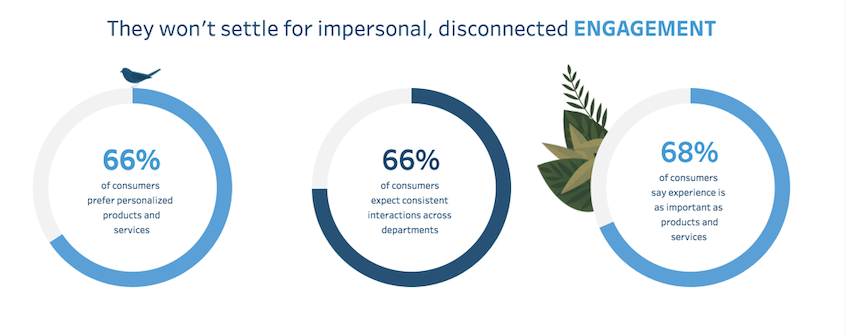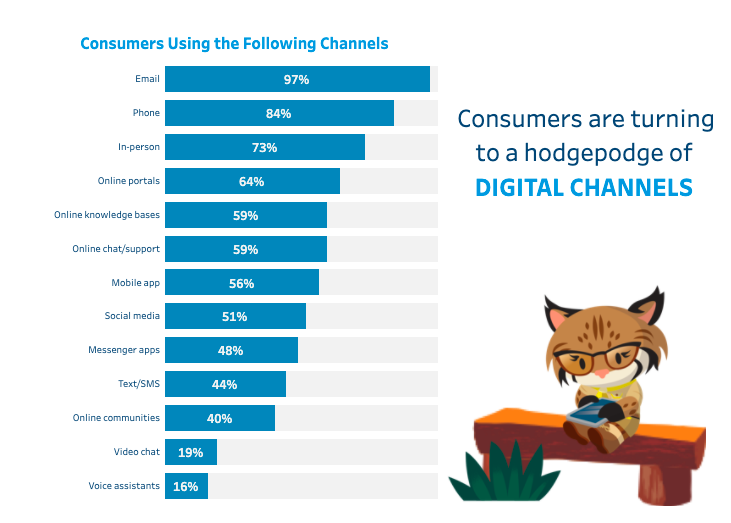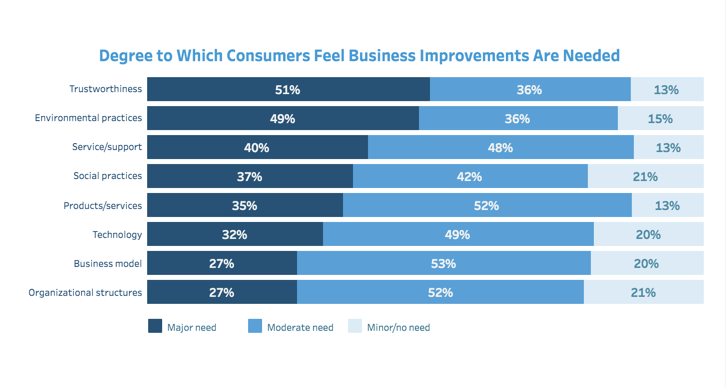Key insights from the Fourth Edition of the State of the Connected Customer Report 2021.
In a time when the global marketplace is experiencing unprecedented shifts in customer expectations and behaviour, businesses need to keep a finger firmly on the pulse of market opportunities more than ever before as they digitally transform.
This year, entire European markets have been transformed, and as we look to continuing uncertainty in 2021, there are new standards of engagement in play.
In this article, we’ll share five must-haves for connected customers, gleaned from our recent survey of over 15,000 consumers and business buyers — including insights from Belgium. Below are the consumer expectations and behaviours you need to know and leverage as you plan your strategy for the year ahead.
1. Connected customers crave exceptional experiences
Exceptional customer experiences are the foundation for solid relationships with connected consumers. It’s no longer enough to simply deliver on product and service, with 80% of connected customers globally (85% of business buyers and 79% of consumers) agreeing that the experience a company provides is as important as their product and service, connected consumers are craving remarkable experiences across a range of criteria.
So, in a time when consumers are generally demanding more from companies, what characterises an exceptional experience? Ensuring experiences — in a never normal — are personal and empathetic, convenient, available digitally as well as through more traditional and offline channels are all part of the mix.
Additionally, as consumers increasingly consider the role of business in society — shifting their expectations of companies to include delivering for stakeholders more than merely shareholders — how a company communicates, and delivers on, their values, also becomes a piece of the customer experience.
When companies transform the ordinary into the extraordinary, those experiences deepen the client relationship, and that translates to sales, with 53% of customers saying that they feel an emotional connection to the brands they buy most often.
2. Business is personal and Innovation is key in Belgium
Belgian marketers want to be at the forefront of innovation. Increasingly consumers are taking personalisation as a given with more than half (52%) of consumers expecting that offers are personalised (up three percentage points year-on-year globally).
In a time when everyday life is characterised by change and uncertainty, customers are also looking for these personalised experiences to reflect their unique needs.
Considering the multitude of touchpoints a customer can have with a business, connected customers are demanding better integration and use of their data, and associated targeting, eliminating unnecessary burdens in an already stressful time. Read more on the top trends in Belgium.
In Belgium, 66% of consumers expect a consistent interaction across departments. However, with more than half (54%) of global customers saying that it generally feels like sales, service, and marketing don’t share information, there’s a clear case for the integration of customer data across systems and processes.
More than simple personalisation, connected customers are seeking engagements that demonstrate empathy for their personal situation. There’s no doubt that such a personalised experience will rely on leveraging not just the various touchpoints for consistency, but the use of personal information as well.
With that in mind, businesses are not only challenged to leverage data and user experience to innovate in their approach to personalisation, but also to ensure that they do so in a transparent way. As stewards of consumer data, businesses must rise to the innovation challenge ethically.
3. Optimised, multichannel, high-touch interactions are required
As individuals and businesses across the globe responded to ongoing health, economic, social justice, and environmental crises throughout 2020, for many, the personal and the professional merged as we witnessed a rapid and extensive shift to digital.
The acceleration of our online lives has altered customer expectations and will continue to impact the way that we do business. How we communicate and use sales tools and tactics with our clients, colleagues, and communities has been dramatically altered, with innovation and seamless engagements being demanded by the global population.
Connected customers are challenging companies to deliver across more channels, in more formats, than ever before. Perhaps unsurprisingly in these socially distant times, younger generations are demanding evolution of the experiences they have come to expect from their favourite brands to support virtual engagements.
For example, 77% of Gen Zers believe that companies should offer new ways to get existing products and services via digital versions of traditionally in-person experiences. This craving for innovation and expanded channels provides us with an interesting glimpse into the expectations of the customer of the future.
In Belgium, consumers are turning to a variety of data-driven digital channels outweighing the global averages. Email is used most frequently at 94%, followed by phone, online chat, and support, as well as online portals and knowledge bases.
Staying ahead of the curve in Belgium will require that brands keep their finger on the digital pulse as channels continue to evolve and offer new online opportunities for digitally-driven customers.
Interestingly, it’s important to note that while digital is the preference for customers, variety remains of the utmost importance as global customers turning to an average of nine channels to browse inventory, seek advice, and make purchases.
4. Connected customers want to know you, too
You know your customers, and they want to know your business and what it stands for. As the world has evolved and shifted, so too have the criteria customers consider to evaluate brands.
With corporate values impacting both customer acquisition and retention, your communications planning should include consideration around how, where and when your business communicates its positions on community involvement, economic and racial injustices, environmental practices.
Of course, the treatment of both customers and employees throughout the current crises is critical and is an essential part of the customer experience. In an increasingly virtual world, it’s important that your business is not only communicating its corporate values and commitments but taking action in support of those commitments across every available channel due to the rapid acceleration of digital transformation.
Corporate values and social responsibilities have long been considered in discussions of stakeholder capitalism and doing what is right. Now, though, against a backdrop of continuing change and challenge throughout 2020, companies are facing tougher critics across the globe. Your corporate reputation is being shaped by the intersection of societal issues like never before.
5. Do what’s right
With 86% of globally connected customers agreeing that the societal role of companies is changing, your customers (and prospective customers) are beginning to consider company accountability in ways they haven’t previously. What’s more, those considerations are impacting their buying behaviour.
As is the case globally, in Belgium, trustworthiness comes up top of the list in terms of areas for business improvement. 51% of Belgium customers think that the business community has a major need to improve trustworthiness. A further 36% perceive a moderate need. These numbers present a less onerous undertaking than the global view (where 92% of respondents perceived trustworthiness as either a major or moderate need) but there’s still plenty of work to be done.
The importance of building trust and loyalty with customers isn’t new. However, it has been critically magnified against the background of continuing global crises. Today, 90% of global customers believe that how a company acts during a crisis reveals its trustworthiness, providing an incredible opportunity to businesses to prove themselves in the current climate.
Calling on businesses to innovate in more ways than ever before, the Belgium experience stresses a need to improve green practices as the second-highest priority, again in line with global rankings of areas for improvement. A whopping 85% of respondents in Belgium think that the business community has either a major or moderate need to improve environmental practices; globally once again we see a higher belief in a major or moderate need for change at a rate of 89%.
Unprecedented and global crises have provided a catalyst for change
As global customers and businesses begin to demand more from the companies they choose to do business with, the organisations that take the opportunity to step back, evaluate the new operating environment, and new consumer demands, and re-strategise will be the ones who thrive.








